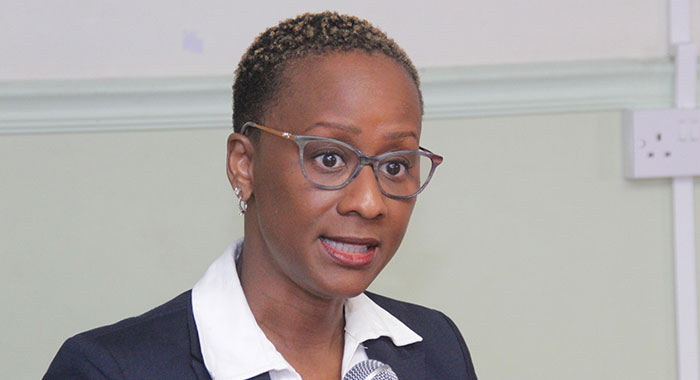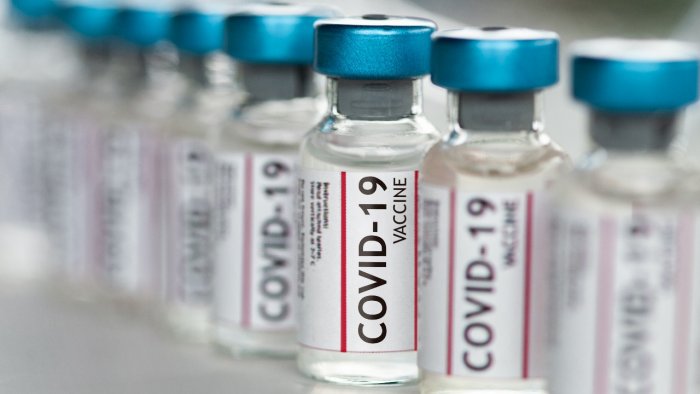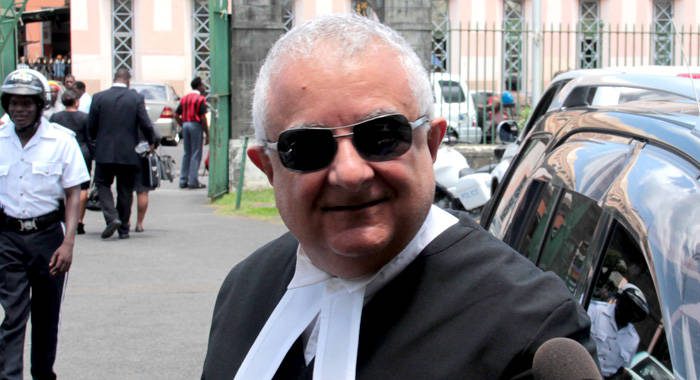The government’s decision to stop requiring COVID-19 vaccination for some public sector workers did not result from “a flip of the coin in the air”, the lead counsel for the respondents (government) in the vaccine mandate lawsuit said at the trial this week.
“The claimants said the fact that the policy was changed was an egregious act of arbitrariness,” Senior Counsel Anthony Astaphan told High Court judge Justice Esco Henry during the virtual hearing.
“But the CMO (Chief Medical Officer), in affidavit evidence, continuously drew the distinction between Delta virus which was the dominant virus at the time, the special measures were made and the changes that came with Omicron,” Astaphan said.
He noted that CMO Dr. Simone Keizer-Beache, said in her affidavit that based on her continuous analysis of the global, regional and Vincentian situation, and, importantly, the evolution of the virus, she advised the Minister of Health that only healthcare workers should continue to be required to be vaccinated.
“So, it wasn’t a flip of the coin in the air. It was based on the science that was before the CMO and she gave the reasons why, based on her analysis of the situation and the variants of the virus, that the requirements for vaccines should be limited to only those in healthcare,” the lawyer said.
He added that in his affidavit, Minister of Health, St. Clair Prince said that following the decision of the Cabinet to approve the draft of the special measures, he caused SR&O 28 of 2020 to be published in the Gazette in accordance with the Public Health Act.
SR&O 28 of 2020 which contain the recommendations of the CMO and rules recommended and approved by the Cabinet to ensure compliance with the core medical recommendation especially Regulation 5, the lawyer cited the minister as saying.
SR&O 28 of 2020 brought the vaccine mandate into effect.
Astaphan also asked the court that in coming to its decision, to consider the affidavit of the Minister of Public Service, Frederick Stephenson, who said the draft order also included other rules to ensure compliance with the SR&O.
“So, while the claimants are right that the Chief Medical Officer may not have recommended A, B or C as was submitted, she clearly recommended that the unvaccinated should not be allowed in the workplace period without being vaccinated,” Astaphan said.

Astaphan told the court this week that the change in policy was not “an egregious act of arbitrariness”, as the claimant had argued.
Astaphan said the CMO testified as to the reasons why she felt that the special measures were required.
He pointed out that the CMO said that one of the recommendations she gave to Cabinet was that unvaccinated public sector workers should not enter the workplace because if an unvaccinated worker enter the identified high-risk workplace, they would present a risk of infection or risk being infected by the patients, students, prisoners and so on.
Keizer-Beache also recommended that the frontline employees be exempted from the requirements for vaccinations on medical grounds and religious grounds.
Astaphan said that in coming to her decision about recommending vaccination of public sector workers, the CMO considered the vaccines that were approved for use in St. Vincent and the Grenadines and she was also satisfied that the vaccines were safe and would reduce the risk of transmission and associated severe illness, hospitalisation and deaths.
She further said that the rates of hospitalisations and deaths were highest among the unvaccinated.
Keizer-Beache said she was satisfied that in relation to the earlier variants, including Delta, the vaccine reduced the rate or risk of transmission and significantly reduced the risk of hospitalisation and death.
Again, this was supported by the fact that the vast percentage of those infected, hospitalised or died were unvaccinated.
Astaphan noted that the CMO said because of the Omicron variant, SVG saw a reduced efficacy and effectiveness of the vaccines used in SVG in preventing the transmission of the virus.
However, all of the vaccines remain significantly effective in reducing the risk of severe infection, hospitalisation and death, the CMO said.

The lawyer noted that Keizer-Beache said that despite Omicron, the World Health Organization continues to promote and encourage vaccination as the best defence against COVID-19.
“There is no basis at all in this case for the rational interpretation of the advice which the chief medical officer got, or which the chief medical officer gave to the minister, could be challenged,” Astaphan argued, adding that in the pretrial hearing, the court ruled that there is no basis for medical challenges to the vaccines and to the protocols.
“What she (CMO) said was that she realised with the rising infection rates and hospitalizations and death, that the pre-existing protocols that she had put in place — of sanitisation, distancing and mask — were not effective.”
He said the CMO had to find an effective measure to combat the virus that was spreading in SVG.
“And she said the most effective tool that she could have used, seeing the others were not as effective as they should have been, was the vaccines,” Astaphan said, adding that there was no evidence from anybody in the case to question or to challenge the integrity or the credibility of that evidence.
The trial ended on Thursday and Justice Henry reserved her decision, saying it might not be handed down until the New Year.
The claimants in the cases are Shaneil Howe, Novita Roberts, Cavet Thomas, Alfonso Lyttle, Brenton Smith, Sylvorne Olliver, Shefflorn Ballantyne, Travis Cumberbatch, and Rohan Giles.
The respondents are The Minister of Health and the Environment, The Public Service Commission, the Commissioner of Police, the Attorney General and the Police Service Commission.
Jomo Thomas and Sherlan “Zita” Barnwell also appeared for the claimants.
Appearing with Astaphan for the respondents were: Solicitor General Karen Duncan, Senior Crown Counsel Cerepha Harper-Joseph, Crown Counsel Moureeze Franklyn, and Graham Bollers.







LOL LOL, why all the people who had suffered adverse effect from the jab did not go to that very special country to have it ? What a bunch of liars. ar yo believe everybody dotish?
As a policy matter, it seems that our government employs this ‘one’ lawyer to defend its position in Court 99% of the time, whether the matter is civil or criminal. Why so? Do we still pay him in U.S dollars? I seem to recall that was once part of the deal, is that still the case?
Ever so often the newspapers show pictures of our local academics and legal intelligencia being called to the bar. Although some ‘great ones’ have “passed on”, do we not have any homegrown legal eagles with the required acumen and capability to present our Government’s held position to the Court? What has been his success/loss ratio over the years? How does the wider legal diaspora view our judicial fraternity? Is SVG (our treasury) used as a cash-cow? Should we “buy local” and at the least ensure our money remains in the country? I’d like to get some responses to this musing.
Just good for thought, but as citizens of this country we have a right to know how our largesse is being disbursed.
I do not understand the need to bring in this telephone number fee charging horrible little man.